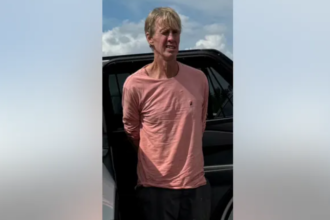Maryland’s attorney general and governor’s offices announced Friday that they will investigate all deaths in police custody that were overseen by the state’s former chief medical examiner, who testified as a defense witness in the trial of former Minneapolis police officer Derek Chauvin. Last week, Chauvin was found guilty of murder and manslaughter in the death of George Floyd.
Floyd died as a result of a sudden heart rhythm disturbance during police restraint due to underlying heart disease, according to Dr. David Fowler, who served as Maryland’s chief medical examiner from 2002 to 2019 and is now a consultant.
Floyd’s death was also attributed to fentanyl and methamphetamine in his system, as well as possible carbon monoxide poisoning from auto exhaust, according to the retired forensic pathologist. Other experts testified that Floyd died from a lack of oxygen, contradicting Fowler’s testimony. Floyd’s cause of death was also classified as “undetermined,” contradicting the medical examiner in Hennepin County, who ruled it a homicide.
Maryland Attorney General Brian Frosh and Maryland Governor Larry Hogan announced the investigation on Friday, less than 24 hours after the Attorney General’s Office received a letter signed by 431 doctors from across the country from Washington, D.C.’s former chief medical examiner Roger Mitchell, saying Fowler’s conclusions were so far outside the bounds of accepted forensic science.
“Dr. Fowler’s stated opinion that George Floyd’s death during active police restraint should be certified with a ‘undetermined’ manner is outside the standard practice and conventions for investigating and certification of in-custody deaths,” the letter stated. “This stated opinion raises significant concerns for his previous practice and management.”
The letter demanded that Fowler’s medical license be investigated at the state and federal levels, as well as a review of the Maryland Office of the Chief Medical Examiner during Fowler’s 17-year tenure.
The Washington Post reported that Raquel Coombs, a spokeswoman for Frosh, said the office had been discussing launching an investigation into in-custody death reports conducted during Fowler’s tenure for weeks and had contacted the governor’s office about how to proceed.
In a statement, Coombs said, “We agree that it is appropriate for independent experts to review reports issued by the Office of the Chief Medical Examiner (OCME) regarding deaths in custody,” “We are already in conversations with the Governor’s Office about the need for such a review, and have offered to coordinate it.”
A spokesman for Hogan, Michael Ricci, said the governor’s office welcomes an independent review of reports on deaths in custody issued during Fowler’s tenure and agrees that “it is appropriate for the Office of the Attorney General to coordinate the work group.” Hogan “has designated his chief legal counsel to serve as a liaison for this effort.” according to Ricci.
Fowler told The Baltimore Sun that he was unaware of any such review being considered and defended his office’s work, pointing out that he was not solely responsible for autopsy conclusions. “There’s a large team of forensic pathologists, with layers of supervision, and those medical examiners always did tremendous work,” Fowler said on Friday. He refused to talk about his testimony in the Chauvin case.
The chief medical examiner’s office, according to Bruce Goldfarb, is “committed to transparency and will cooperate fully with an inquiry.”
Coombs stated that no state officials or staff connected to a lawsuit filed by the family of Anton Black, a 19-year-old who died in police custody in Greensboro in 2018, will be involved in the review of death determinations. Black’s death was caught on camera, with Greensboro cops holding the unarmed teen down for more than six minutes. Black died as a result of a sudden cardiac event while battling police, not because he was pinned in a prone position, according to Fowler.
The state is being represented by the Attorney General’s Office in a lawsuit filed by Black’s family against Fowler, the state, and others. They’ve requested that the Black case be dismissed.
“We have taken steps to wall off those in our office who are representing the (Office of the Chief Medical Examiner) and its current and former employees, including Dr. Fowler, from those who might be involved in any review of (the examiner’s) reports,” Coombs wrote.
According to the Associated Press, the death of Tyrone West, who died after a struggle with Baltimore police following a traffic stop in 2013, is included in the time period to be examined.
There was a violent struggle between the officers and West, according to witnesses and the officers themselves, but the state medical examiner’s office determined that he died of natural causes exacerbated by the struggle and the summer heat. Tawanda Jones, West’s sister, has been fighting for her brother’s case to be reopened for the past eight years. The review was “the best news I’ve gotten all day.” she said.
One of Fowler’s most well-known decisions involved the death of Freddie Gray.
Gray died from injuries sustained in the back of a police van, according to the ruling. The autopsy determined that his death was a homicide due to officers’ failure to care for him and seek medical attention, prompting State’s Attorney Marilyn Mosby to file charges against six officers. All of the charges against them were either dropped or acquitted.














